

Never Give up, Never Surrender. By Jason Calacanis A year ago SNS (social network service) Path.com launched as the anti-Facebook.
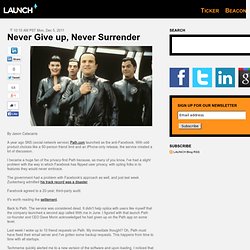
With odd product choices like a 50-person friend limit and an iPhone-only release, the service created a lot of discussion. I became a huge fan of the privacy-first Path because, as many of you know, I've had a slight problem with the way in which Facebook has flipped user privacy, with opting folks in to features they would never embrace. Forget Lean Forward and Lean Back. By Jason Calacanis For the better part of the last two decades we've compared the lean-forward experience of computers with the lean-back experience of television.
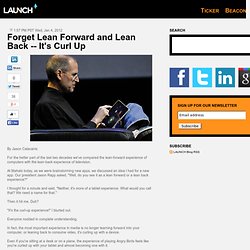
At Mahalo today, as we were brainstorming new apps, we discussed an idea I had for a new app. Our president Jason Rapp asked, "Well, do you see it as a lean forward or a lean back experience? " I thought for a minute and said, "Neither, it's more of a tablet experience. What would you call that? Founders Define Reality (& Give Hope) By Jason Calacanis I recently had author Warren Bennis on "This Week in Startups" and he said something that struck me deeply: "Leaders define reality.
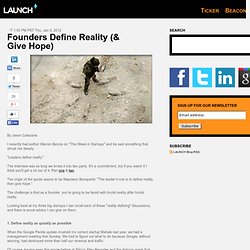
" The interview was so long we broke it into two parts. It's a commitment, but if you watch it I think you'll get a lot our of it. Part one & two. The origin of the quote seems to be Napoleon Bonaparte: "The leader's role is to define reality, then give hope. " The challenge is that as a founder, you're going to be faced with brutal reality after brutal reality.
Looking back at my three big startups I can recall each of these "reality defining" discussions, and there is some advice I can give on them. 1. When the Google Panda update crushed my current startup Mahalo last year, we had a management meeting that Sunday. Of course, having seen this movie before at Silicon Alley Reporter and the dotcom crash that took 90% of our revenue, I knew the answer: cut costs quickly and deeply and don't be delusional. 1. 2. 3. 4.
The Cult of Amazon Prime. By Jason Calacanis There are two types of people in the world: those with Amazon Prime and those without.
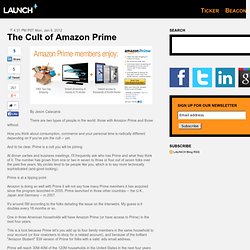
How you think about consumption, commerce and your personal time is radically different depending on if you've join the cult -- yet. And to be clear, Prime is a cult you will be joining. At dinner parties and business meetings, I'll frequently ask who has Prime and what they think of it. The number has grown from one or two in seven to three or four out of seven folks over the past five years. Prime is at a tipping point. Amazon is doing so well with Prime it will not say how many Prime members it has acquired since the program launched in 2005. It's around 5M according to the folks debating the issue on the interwebs. One in three American households will have Amazon Prime (or have access to Prime) in the next four years.
Prime will reach 30M-40M of the 120M households in the United States in the next four years (with ~20M accounts). Our leader is Bezos. The Prime Lifestyle Wrapping up. The Two Most Important Startups in the World. By Jason Calacanis The two most important startups in the world: AngelList and Kickstarter.
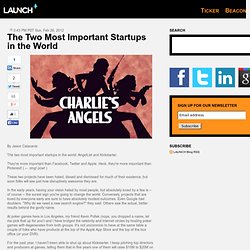
They're more important than Facebook, Twitter and Apple. Heck, they're more important than Pinterest! ( ← zing! Pow! These two projects have been hated, dissed and dismissed for much of their existence, but soon folks will see just how disruptively awesome they are. In the early years, having your vision hated by most people, but absolutely loved by a few is -- of course -- the surest sign you're going to change the world. The One Product That Makes Apple a Trillion-Dollar Company Overnight. Apple will become a trillion-dollar company based not on iPads and Apple TV, but payments.
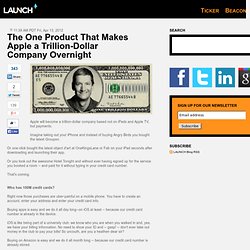
Imagine taking out your iPhone and instead of buying Angry Birds you bought the latest Groupon. Or one-click bought the latest object d'art at OneKingsLane or Fab on your iPad seconds after downloading and launching their app. Or you took out the awesome Hotel Tonight and without ever having signed up for the service you booked a room -- and paid for it without typing in your credit card number. That's coming. Who has 100M credit cards? Right now those purchases are uber-painful on a mobile phone.
Buying apps is easy and we do it all day long--on iOS at least -- because our credit card number is already in the device. iOS is like being part of a university club: we know who you are when you walked in and, yes, we have your billing information. Good to Great to Excellent: A Roadmap. By Jason Calacanis I've spent the past two decades building products.
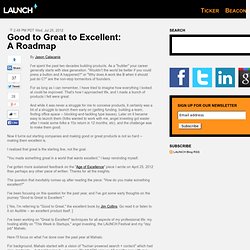
As a "builder" your career generally starts with idea generation. "Wouldn't the world be better if you could press a button and A happened? " or "Why does A work like B when it should just do C? " LAUNCH -